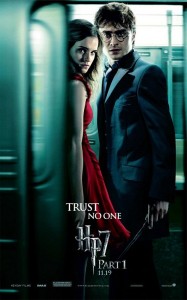BEWARE OF SPOILERS. Our generation has grown up alongside Harry Potter, Hermione Granger and Ron Weasley — their adventures in both the film and book series have defined an era. J.K. Rowling created a story to which everyone could seemingly relate — the final two films alone are predicted to gross over $1 billion. Harry’s story has been translated into 69 languages and has sold over 400 million books worldwide. And Friday, Nov. 19, “Harry Potter and the Deathly Hallows: Part 1,” the first half of the final installment, premieres.
To kick off the celebrations, I have created a list of my three favorite novels and films, respectively. The choices weren’t easy, and after much deliberation I chose the following:
Books
3.) “Harry Potter and the Goblet of Fire”
This book was J.K. Rowling’s first novel to break the 400-page barrier. In fact, coming in at 734 pages, it nearly doubled the length of any of the preceding books. Thankfully though, it was not just filled with fluff — every page is action-packed. From the Quidditch World Cup to the Triwizard Tournament, Rowling really demonstrates her writing prowess for the first time with “Goblet of Fire.” In addition, Harry develops both as a man as a wizard: He shows off his true magical abilities, without the aid of Hermione or Ron, in the three dangerous tasks of the tournament. In the end, Harry is captured by Lord Voldemort and watches him rise to his full power once again. This novel sets the stage for the following three books and shows us Harry as we had never seen him before.
2.) “Harry Potter and the Half-Blood Prince”
The “Half-Blood Prince” brings us the concept of “horcruxes” — objects that one can hide pieces of their soul in, so as to live forever. The idea of a horcrux inspires Harry and Dumbledore to delve into memories of Voldemort’s past. These insights into Voldemort’s history provide greater understanding of his motives and desires, paving the way for “Deathly Hallows.” This book deserved the second spot because of this dark and intense look into the life our antagonist. In the end, Harry’s mentor, Dumbledore, is murdered, leaving the wizarding world to look for another hero to step into his robe.
1.) “Harry Potter and the Deathly Hallows”
Harry succeeds in living up to Dumbledore’s example in this novel, while also succeeding in killing his enemy. All the storylines are neatly wrapped up and we’re left with a happy ending. However, the book isn’t good just because our hero wins. One of the most emotional and interesting chapters in the entire series is contained in this book. Harry is shown memories from his nemesis and the man who killed Dumbledore, Severus Snape. Harry learns that Snape was as important in Voldemort’s defeat as he was himself. The defeat of Voldemort, Snape’s memories and the entire climax help earn this book the top spot.
Movies
3.) “Harry Potter and the Sorcerer’s Stone”
Despite its poor child acting and its campy feel, this film would rank in the top three for nostalgia alone. However, the sophomoric feel is appropriate — it increases the sense of wonder as we experience the wizarding world for the first time alongside Harry. The director, Chris Columbus, did a good job of translating the characters and the magic experience into film.
2.) “Harry Potter and the Prisoner of Azkaban”
This is the only entry in the series that was directed by Alfonso Cuarón (“Y tu mamá también” and “Children of Men”). Cuarón certainly left his mark on the series — the film stands out from the rest both stylistically and thematically. His cinematography and editing work together flawlessly to bring Rowling’s third book to life. Cuarón takes Harry Potter and transforms it from a book into a true cinematic experience for the first time.
1.) “Harry Potter and the Half-Blood Prince”
The movie both accurately depicts the story set out in the book, but also adds interesting elements of its own. Unlike previous films, the movie contains many strong elements that are not originally in the novel. For example, one scene tells a touching story about Harry’s mother and a gift she gave to her professor. David Yates also does a fantastic job creating a dark and moody film that suits the gloomy plot. The film ends in heartache — Dumbledore’s death. However, the viewer is left hopeful for the entire future of Harry Potter.
Penney is a member of the class of 2012.






